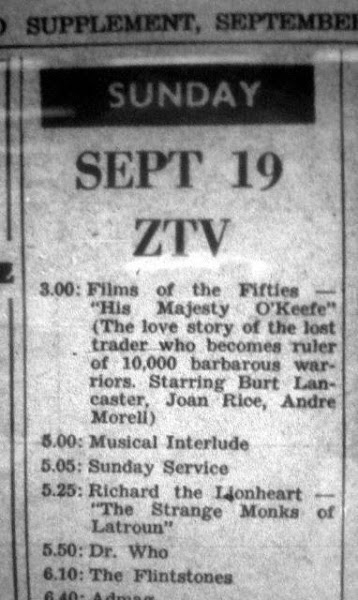 |
| Copyright exzim |
I do enjoy a convoluted argument. But this is, to some extent, a Doctor Who flavoured blog. And it therefore occurred to me (quite naturally) that the simplest thing to do would be to travel back in time, and get myself some photographic evidence.
Impossible, you say? It sort of isn't. This link will take you to a collection of photographs by 'exzim', who worked for RTV in Kitwe (Zambia) from 1963 to 1965, and in Salisbury (Rhodesia) in 1966. And he's very kindly given me his permission to reproduce the pictures that follow. I'm enormously grateful.
Before going further, though, I need to stress that they are copyright and they mustn't be copied or linked to without his express agreement. I know what you Internet types are like. Don't do it, kids.
By way of background, exzim was one of four British engineers hired by RTV in mid-1963; he and one other went to Kitwe, one went to Salisbury, and one to Bulawayo.
exzim and his colleague's contracts then passed to the new ZTV on independence. And, after two years, while the others returned to England, he went on to work at RTV in Salisbury (his former Kitwe colleague returned to work in Zambia briefly in 1967 and, on the instructions of the Zambian government, moved the equipment to Lusaka).
Here are the RTV Studios in Kitwe in 1963:
 |
| Copyright exzim - see http://www.pbase.com/exzim/profile |
Notice the RTV logo? I gather it was replaced with a ZTV one eventually. And this next picture is between those two stages, when the RTV logo has been removed, but the ZTV one hasn't yet been added:
 |
| Copyright exzim - see http://www.pbase.com/exzim/profile |
 |
| Copyright exzim - see http://www.pbase.com/exzim/profile |
 |
| Copyright exzim - see http://www.pbase.com/exzim/profile |
 |
| Copyright exzim - see http://www.pbase.com/exzim/profile |
I recognise Harold Wilson and Ian Smith, but not the others. The camera, presumably, is a Philips* one (I'll come back to that below).
Back outside, this picture documents an attempt to set up a video link from the RTV studio in Highlands to the downtown:
I don't know about you, but I enjoyed those. What's more, as you'll have gathered above, exzim was also kind enough to tell me a little about his time at RTV.
Again with his permission, here's some of what he had to say:
'Your summary of the relations between ITV, RTV, and ZTV is correct as far as I know. They had a lock on distribution rights for that area for many programs, it wasn't big enough for people to fight over, so they split ITV to avoid sanctions and just went on'.And:
'The Dutch ownership resulted in all the equipment being of Phillips manufacture, which made replacement parts availability difficult. But the work was of interest, and I always say I learnt my job in Africa.'
And, intriguingly, this:
'Before UDI, while some sort of relations existed between Zambia and Rhodesia, the programs were 'bicycled' by Central African Airways. With UDI, and the breakup of CAA, the programs were shipped back to South Africa, then back to the UK and then back to Zambia as I understand. But I'm not sure, I was in Salisbury when UDI occurred.'And:
'I would think in those days (1960s) there was insufficient air traffic between African nations to make biking the tapes or films between them possible. My guess is that they were returned to London, and then sent on from there. To the best of my knowledge, which admittedly could be wrong, it was quicker to fly from Lusaka into London and then out to Nigeria, than to try to fly to Nigeria directly. BOAC had a daily overnight flight to Kenya, Ndola in Zambia, Salisbury, (Harare) and Johannesburg, and South African Airway had the same. We had spare tubes (valves) for the equipment delivered that way. After UDI the Salisbury stop was dropped.
Sabena had a flight out of Brussels that went Madrid (I think),
Kinshasa (Leopoldville), Johannesburg, and various ex French states had connections into Paris.
After UDI and the movement against apartheid got going, SAA changed their routing to Luanda in Angola, the Cape Verde Islands, Geneva, London, and TAP, the Portuguese airline did the same.
Air traffic was still a colonial times relic.'
More about these and other things later, I hope.
Meanwhile, exzim's galleries also include some fascinating photographs of his time at ABC in Teddington, Middlesex. Not least of these is a photograph of a production meeting for Armchair Theatre, which is of course another series with lots of missing episodes. You should take a look.
Meanwhile, exzim's galleries also include some fascinating photographs of his time at ABC in Teddington, Middlesex. Not least of these is a photograph of a production meeting for Armchair Theatre, which is of course another series with lots of missing episodes. You should take a look.
---------------------------------------------------------------------------------------
*Small update (18 April 2015) - it appears that this is in fact a Fernseh camera! Thanks to exzim and his Facebook associates for clarifying that. It looks like the 1963 model shown here:










